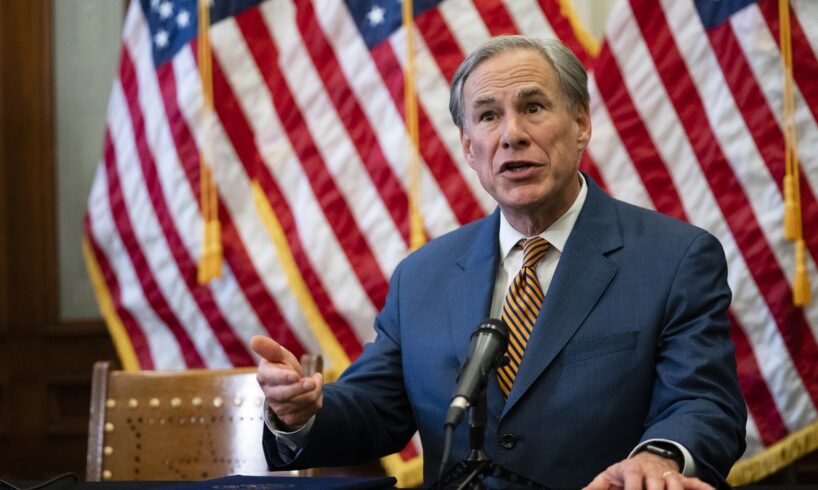
California Gov. Gavin Newsom’s latest attempt to restrict gun rights is receiving pushback from Texas lawmakers in what is shaping up to be a juxtaposition of two very different state governments: one that says its state is a sanctuary for the unborn, and one that says its state is a sanctuary for doctors who perform abortions.
After the U.S. Supreme Court refused to enjoin the Texas law allowing private citizens to sue abortionists and those “aiding or abetting” with an abortion after a heartbeat is detected, Newsom said California would become a “sanctuary” for abortionists. He also said the state would look into passing a law to allow private citizens “to sue anyone who manufactures, distributes, or sells an assault weapon or ghost gun kit or parts in California.”
But the Texas law’s author, state Sen. Bryan Hughes, R-Mineola, told The Houston Chronicle, “I would tell Gov. Newsom good luck with that. If California takes that route, they’ll find that California gun owners will violate the law knowing that they’ll be sued and knowing that the Supreme Court has their back because the right to keep and bear arms is clearly in the Constitution, and the courts have clearly and consistently upheld it.”
Newsom said that he directed his staff “to work with the Legislature and the Attorney General on a bill that would create a right of action allowing private citizens to seek injunctive relief, and statutory damages of at least $10,000 per violation plus costs and attorney’s fees, against anyone who manufactures, distributes, or sells an assault weapon or ghost gun kit or parts in the State of California. If the most efficient way to keep these devastating weapons off our streets is to add the threat of private lawsuits, we should do just that.”
Hughes points out that gun rights are protected by the Second Amendment enshrined in the U.S. Constitution, whereas abortion rights come from a Supreme Court ruling in Roe v. Wade, where “an activist Supreme Court just made that up.”
In response to Newsom’s claim, Texas Gov. Greg Abbott said, “This is exactly what Beto would do if elected Governor of Texas. I won’t let that happen. Texas is a pro-Second Amendment state – and will stay that way.” Abbott’s referring to former Democratic congressman and presidential candidate Robert “Beto” O’Rourke, who notoriously claimed he would ban so-called “assault weapons” like AR-style rifles in his run against Republican Sen. Ted Cruz in the last election.
O’Rourke is currently running for governor against Gov. Abbott.
The Texas heartbeat bill received bipartisan support and passed the legislature earlier this year. Gov. Abbott signed it into law, and it took effect on Sept. 1. Reproductive rights groups immediately sued, hoping the Supreme Court would overturn the ban, which it didn’t.
The law prohibits abortions from being performed after a baby’s heartbeat is detected and allows for a private right of action against any doctor or medical professional who performs one. It also allows individuals to sue anyone who aids with the abortion, including those who drive a woman to a clinic or help pay for it. Each plaintiff could receive up to $10,000 for each violation, according to the law. Those filing lawsuits don’t have to be Texas residents or know the woman getting the abortion.
Those who perform an abortion after a heartbeat is detected would be violating the law and legally face an unlimited number of lawsuits, making performing the procedure cost-prohibitive. The only exception in the law is for medical emergencies.
The nonprofit organization Texas Right to Life, which is embroiled in a lawsuit over the law going through the state court system, says the law continues to save between 75 to 100 pre-born children from abortion every day.
It also notes that the Supreme Court “refuted the abortion industry’s unprecedented strategy to block the Texas Heartbeat Act,” and affirmed that abortionists could not sue judges, court clerks, the Texas attorney general, or private citizens. The case the court allowed to continue relates to state health officials as defendants, which Texas Right to Life argues is invalid.
Amy Hagstrom Miller, president and CEO of Whole Woman’s Health and Whole Woman’s Health Alliance, which sued over the law and operates abortion clinics in Texas, argues the Supreme Court allowing the heartbeat bill to remain in effect is “unjust, cruel, and inhumane.”
The majority of the women that come to WWH clinics to have an abortion, she says, are “already parents, working multiple jobs, and navigating school and work” who can’t get time off of work, arrange childcare or afford traveling to another state to have an abortion.
The majority coming to WWH clinics are “being forced to carry a pregnancy against their will,” she says, which is “cruel.”
Currently, Texans who are more than six weeks pregnant seeking abortions are traveling to the neighboring states where appointments can be several weeks.
“No doctor or clinic staff member should have to turn away their patient due to fear of being sued by self-appointed vigilantes,” Miller adds. She remains committed to fighting the law.
In a tweet asking for donations, WWH said, “We don’t back down. Just not how we roll. We’ve won what seemed like impossible cases before and we know we’ll do it again.”
This article was originally posted on Texans weigh in on Newsom plan to go after gun manufacturers